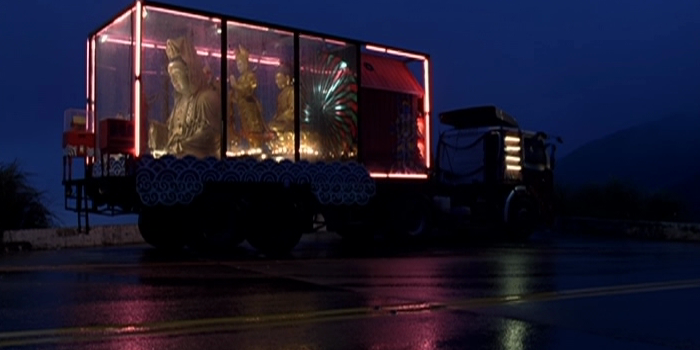Plumply in the middle of a pick ’n’ mix truckload of gods, a golden statue of Guanyin sits serenely, gazing out at the scenery through neon-illuminated perspex. The divine float rumbles on, night and day, a religious riff running through the film, around which melodies of despair and hope fade in and out, opposing and harmonising. Offbeat and effortlessly cool, God Man Dog takes on the big questions of faith and destiny with a lightness of touch but a compassionate eye.

A new mother wanders around her immaculate home, her expression glazed as a religious icon, lost in the depths of post-natal depression. Her partner, powerless and sexually frustrated, tries to navigate home life and career. In a village, a man kneels, desperately hungover and clutching his crucifix, asks for forgiveness after falling off the wagon once again, soon to face the frustration of his long-suffering wife and consternation of his stern pastor. Their daughter -living apart for her own protection – is a talented Sanda boxer-in-training, giving the punchbag hell but just wanting to go home. Then there’s her friend: looks-obsessed and flirting with the dubious side of a modelling career. Completing the roster are two characters that could have come straight from the pages of a Murukami novel: a boy, who habituates the luggage bay of a long-distance coach and can eat with god-like facility; and finally the keeper of the gods himself, the truck driver who shepherds the icons around Taiwan and who seems to have the ability to locate religious figures in remote locations, under direct instruction from the gods. Oh, and the dogs: a pack of them follow the religious float for scraps and will have their own part to play in the unfolding, overlapping stories.

Much like the ponderous journey of the religious float, the film takes time to build up the lives of its characters, giving us unhurried and intimate portraits of their respective worlds. Part of the title of the film in Chinese 流浪神狗人 has the meaning of wandering back and forth; the sense of being lost and out of place. For some characters – like the impish habitué of the luggage bay, or the divinely-inspired collector of gods – that’s a literal description, but everybody in this tapestry is lost in some way. Their various tales, running simultaneously but destined to converge, are each told with a little wink, even in the face of serious drama: from the bitter irony of an absentee father’s relaxation session juxtaposed with the silent desperation of his partner back home; to zealous but uncertain Christians discussing which heretical relics to confiscate from their new convert; to a line of three gods regally displacing a boy from a temple bench.
That sense of absurdity and mischief runs throughout. Repeated closeups revel in the incongruousness of the giant religious statues lumpenly present in assorted locations. The strange stowaway boy who calls himself a ghost and can beat anybody at wolfing down instant noodles is celebrated in all his non-conformity. And the girls’ morally-dubious money-making scheme involving boxing gear and fetishists, is shot with gleeful abandon. It’s testament to the well-constructed script and deft direction that such exuberance can sit alongside moments of serious drama without jarring.
The camera does much of the storytelling work in this film, using shallow depth of field to hold a foreground character out of focus, say, or framing some object at an uncomfortable angle. There is real beauty, too: that gaudy neon truck reflecting softly against rainy tarmac is transformed into something almost transcendental.
God Man Dog gives a wry take on belief and religion and doesn’t shy away from probing questions. Yet as it turns an irreverent eye to the world of faith, it stops short of ridiculing its adherents. Director Singing Chen imbues the movie with a warmth that pokes at foibles without undermining the humanity of its characters. It’s a grace that extends equally to all of the stories, across their various languages (Mandarin, Taiwanese and Atayal) and disparate lifestyles. And ultimately, those very different characters are bound together, not just by the cleverly-written storylines which set them on a collision course, or the religious theme that runs like a thread through the film, but by their shared quest for something intangible – belonging? acceptance? redemption? This inventive, entertaining and celebratory film will not mock anybody for wanting that.
Leave a Reply